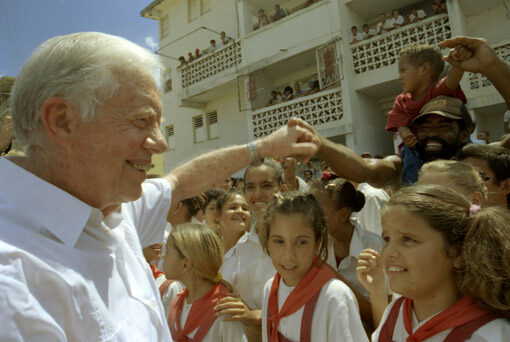On Former President Jimmy Carter’s Cuba Legacy

Former President Jimmy Carter passed away this week at age 100, leaving behind a record of public service, humanitarianism, and personal decency that earned him the respect of political supporters and detractors alike.
The 39th President also left an indelible mark on U.S.-Cuba relations and the Cuban people. Despite yielding mixed results, his pioneering approach toward the island showed that constructive engagement could achieve more than isolation, even with an adversarial government in Havana.
As president, Carter did more than any of his predecessors, and most of his successors, to set U.S. policy toward Cuba in a more practical direction while maintaining an unwavering focus on human rights. His administration’s most significant breakthrough came in 1977 with the opening of the U.S. Interests Section in Havana and the Cuban Interests Section in Washington, D.C., establishing the first permanent diplomatic posts between the neighboring countries since the Cuban revolution. This crucial step created channels for addressing immigration, security, and human rights concerns that would serve both nations for decades to come.
Through direct negotiations with Cuban authorities, Carter secured the release of approximately 3,000 political prisoners and established family reunification visits for Cuban Americans. These visits not only reunited families but showed the Cuban people a positive image of the United States and the Cuban American community, causing many Cubans to question what they had been told about both.
Even when faced with challenges that might have derailed his engagement policy, Carter remained steadfast in his humanitarian principles. During the 1980 Mariel Boatlift, when Fidel Castro sparked a wider migration crisis in response to 10,000 Cubans seeking asylum in the Peruvian Embassy in Havana, Carter chose compassion over expediency, arguably at a steep cost to his political future. “Once those boats were loaded,” he declared at the height of his re-election campaign, “as President, I had a choice to treat them as human beings with a precious light, or to see their lives lost at sea, and I did what was right.”
In his post-presidency, Carter continued to champion both human rights and diplomatic engagement with Cuba. His historic 2002 visit to Havana—the first by a former U.S. president—demonstrated the power of this dual approach. Speaking directly to the Cuban people on live television, he simultaneously criticized the U.S. embargo while voicing strong support for the Varela Project, a democratic reform initiative led by dissident Oswaldo Payá. This broadcast showed Cubans that one could advocate for both improved U.S.-Cuba relations and democratic change on the island.
“The differences between our two countries can be resolved peacefully through mutual respect and negotiation,” Carter often said, maintaining that dialogue and understanding were more effective than confrontation and isolation. His legacy in U.S.-Cuba relations stands as testimony to this belief, showing that principled engagement can advance both national interests and human rights, even in the most challenging circumstances.
(Photo credit: The Carter Center)